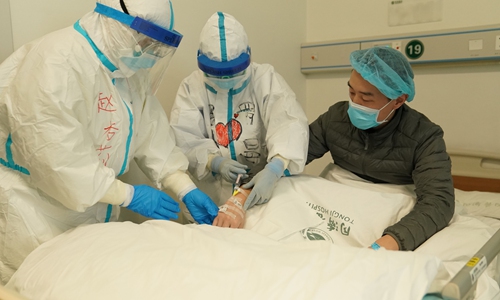HOME >> CHINA,SPECIAL-COVERAGE
Media explains why Wuhan reports more confirmed cases than Hubei Province
Source:Global Times Published: 2020/2/20 14:32:13

Medical workers inject medicine for Li Zuofan (R) at an intensive care ward of the novel coronavirus infection cases at a branch of Tongji Hospital affiliated to Tongji Medical College of Huazhong University of Science and Technology in Wuhan, central China's Hubei Province, Feb. 18, 2020.
Central China’s Hubei Province reported 349 new confirmed cases of COVID-19 on Wednesday, while 615 cases were confirmed in its capital city Wuhan, which has caused some confusion among the public.An explanation made by the People’s Daily on Thursday indicated that a special terminology used in some cities’ infection cases is key in the way total cases reported in Hubei are calculated.
Unlike the most commonly-used terminology of “confirmed cases”, infections in some of the Hubei cities are described as “nucleic acid – minus” cases, which represents a negative number in the province’s total calculation.
The sum of five cities in Hubei with newly confirmed cases is 628, while the total number of other cities with “nucleic acid – minus” is negative 279, therefore, the total number of confirmed cases in the whole province is 349.
“Nucleic acid – minus” cases refer to those who were previously confirmed as "clinically diagnosed cases" but have now been removed from the list because they don't meet the standard of testing positive with a nucleic acid test.
According to the 6th version of the official action plan for COVID-19 diagnosis and treatment released by the National Health Commission on Wednesday, to be categorized as “confirmed cases”, patients have to show either positive nucleic acid testing or highly homologous gene sequencing.
The plan’s 5th version required Hubei to include "clinical diagnosis”, which refers to patients who show pulmonary lesions typical of the new coronary pneumonia following a CT scan, but have not been given a nucleic acid test, reports said.
Global Times
Posted in: SOCIETY